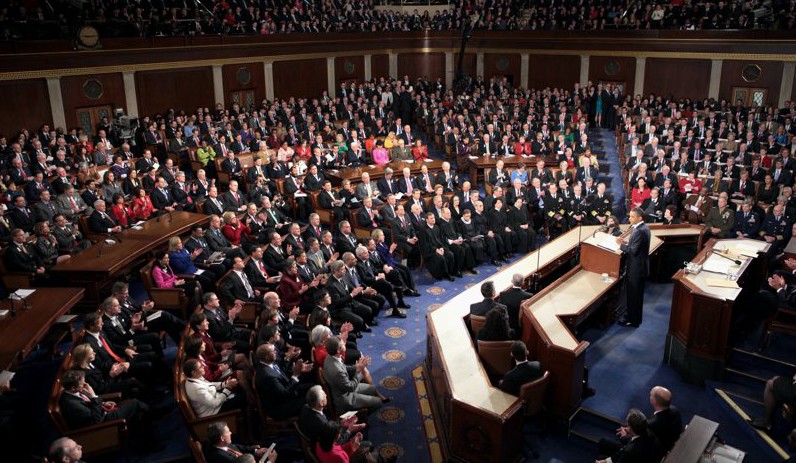One thing that frustrates me about modern American politics is that everyone is always playing it safe. Over the last seventeen years – a period involving a presidential impeachment, a terrorist attack, two major wars, and a financial crisis – the state of our union has always been described a “strong” (or some variation thereof). So it was no surprise that President Obama described the union as “stronger,” even as a sourpuss John Boehner hinted at bitter divisions in Congress. There were handshakes, applause, and a few exemplary Americans handpicked by the White House for public display. Joe Biden’s choice of a purple tie was the night’s boldest statement. And all this from a country in which the president once invited the people into his house to dine on a mammoth wheel of cheese.
I can’t blame the president for sticking close to recent tradition, especially in an era when every political tweet is given endless media scrutiny. There is something to be said for tradition and pageantry, and because our federal government combines its figurehead and its executive in one person such events are bound to happen. And this doesn’t mean it was a bad speech. After a slow start, Obama’s repeated call for a vote on gun control was a powerful moment. The president has found the courage to talk about climate change, and his call for a $9 minimum wage was a welcome piece of liberal red meat (although there are reasonable economic arguments against this proposal).
I was especially encouraged by Obama’s focus on investing in the future, by spending federal money on things like basic research, infrastructure repair, and preschool (although, again, there are debates about the effectiveness of preschool). But an honest and bold speech would have acknowledged that in order to do these things, entitlements will have to be cuts, or taxes raised on everyone, or both. The word “sacrifice” is only used twice in the speech, and only in relation to the military.
The last few elections have become middle class pander-fests, and this speech was no different. Based on speeches like this, we seemed to have solved poverty because it never gets mentioned. The solution to all our problems seems to be in coaxing a few manufacturing jobs back to these shores. The language of “fairness” has replaced any discourse of “equality,” “equity,” or “rights.” Maybe this is an improvement. It certainly plays better to a mass audience. But I think the loss of these concepts and the absence of any discussion of hard truths in our discourse is troubling. I worry our lofty ideals and our notion of sacrifice are being lost in a mad scramble for shrinking share of persuadable voters.
I don’t mean to sound so pessimistic. Any enthusiasm for the speech was tempered by my inner monologue, imitating a Republican member of Congress, who was surely sitting there thinking “no, no, no” every time the president mentioned a new program or investment. Even if Obama promises revenue-neutral policies, Republicans will just see an expansion of federal power and spending and will block anything he proposes. Boehner has already dismissed the idea of raising the minimum wage.
I don’t know what the solution is. Maybe we should just get comfortable with gridlock. But I would really like to see a president make the American people uncomfortable, challenge their preconceived notions, and offer some uncomfortable truths and truly bold proposals. Those won’t pass either, but at least it would make things more interesting – at least for political pundits like me.

It should bother anyone in the year 2013 that we have politicians supporting increasing the minimum wage. For about half a century, mainstream economics has held that a minimum wage INCREASES unemployment. Open any Econ 101 textbook, including, the one used in Principles 0010 at Brown, and read about the negative effects of the minimum wage on employment.
Yes, I would imagine Mankiw makes the point repeatedly.
“The actions of labor unions can have effects similiar to those of minimium wages, leading to structural unemployment…unionized workers earn higher wages and more generous benefits than non-union workers with similar skills. The result of these increaded wages can be the same as the result of the minimum wage: labor unions push the wage that workers recieve above the equilibrium wage. Consequently, there are more people willing to work at the wage being paid than there are jobs available. Like a binding minium wage, this leads to structural unemployment.” -Paul Krugman